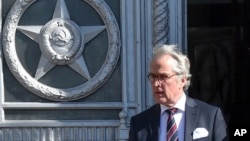Russia ordered new cuts Friday to the number of British diplomats in the country. The move has worsened the clash between Russia and several European countries and the United States over the poisoning of a former Russian spy in Britain.
On Thursday, Russia’s Foreign Ministry announced the removal of 60 American diplomats, in answer to the United States’ expulsion of the same number of Russian diplomats earlier this week.
The increased removal of diplomats on both sides has reached a level unseen even during the height of the Cold War.
More than 20 countries and NATO have ordered the expulsion of over 150 Russian diplomats. The actions were meant as a show of support for Britain over the March 4 poisoning of former Russian spy Sergei Skripal and his daughter, Yulia, in the British city of Salisbury. Britain blamed the poisoning attack on Russia.
Russia has strongly denied involvement in the poisoning. It also announced it would expel the same number of diplomats from each nation.
Russia’s Foreign Ministry intensified the dispute Friday, saying it has ordered Britain to reduce its diplomats in Moscow to the number that Russia now has in London. The ministry has given Britain one month to take action.
In answer, a representative of the British Foreign Office said Russia’s move was “regrettable” but expected, based on its earlier actions.
A hospital treating the Skripals said Thursday that the daughter’s condition was improving quickly. Her father, however, remains in critical condition.
Dmitry Peskov, press secretary to Russian President Vladimir Putin, spoke with reporters on Friday. He said that “Russia didn’t start any diplomatic wars,” and “remains open for developing good ties.”
He also said Russia has called a meeting with the Organisation for the Prohibition of Chemical Weapons next week to push for an “objective investigation.”
Russia has accused Britain of failing to support its claims with evidence and refusing to share materials from its investigation. The Russian Foreign Ministry said it told the British ambassador on Friday that Moscow is ready to cooperate in the investigation.
I'm Alice Bryant.
The Associated Press reported this story. Alice Bryant adapted it for Learning English. Ashley Thompson was the editor.
_______________________________________________________________
Words in This Story
critical – adj. relating to or involving a great danger of death
prohibition – n. the act of not allowing something to be used or done
objective – adj. based on facts rather than feelings or opinions





